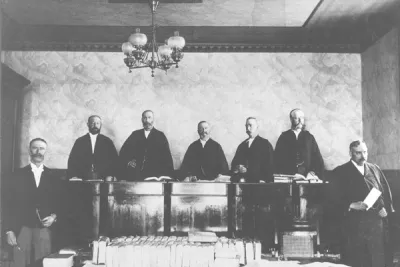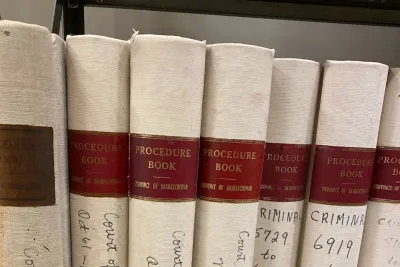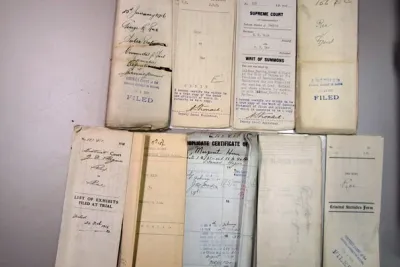Court Records
The Provincial Archives acquires court records by Order in Council; court records must be at least 25 years old before being considered for transfer.
The Provincial Archives has records from the following courts:
- Supreme Court of the North West Territories en banc
- Court of Appeal
- Supreme Court of Saskatchewan en banc
- Supreme Court of the North West Territories/Saskatchewan
- Court of King’s Bench
- Selected records from the District Court
In most cases, docket books (index to court cases) are also open for consultation.
Over time, court records have been inconsistently preserved and many files have been lost prior to transfer to archival custody. The content of files tends to vary from one judicial district to another.
Most court records housed at the Provincial Archives are open and available for research. However, certain records, such as those relating to adoption proceedings and court actions involving young offenders, are not.
Not all of our Collection is described in the catalogue as of yet.
Access Restrictions may apply.
Contact Reference and Outreach Services to see what is available.

James H. Benson, Hugh Richardson, Charles Rouleau, T.H. McGuire and Edward Ludlow Wetmore with other judges in a courtroom, n.d.. Also included in image is James Farquharson Macleod. PAS Photo R-B3813.
How the Court Records are Organized:
Records of court proceedings are created and maintained in the judicial centre in which the court case is heard. Each court jurisdiction maintains its own series of files. These are kept in numerical sequence by the year in which court proceedings began. Reference to a docket book is therefore necessary in order to retrieve the file for a particular court action. The docket book names the plaintiff and the defendant, states the type of action, lists the documents filed and the date they were filed, and provides the file number. Each book is indexed alphabetically.
The type of documents found in court records may vary greatly. Normally records include a statement of claim or complaint, a copy of the writ of summons, a statement of defense, and the judgment of the case. There may also be exhibits, affidavits, declarations, depositions, copies of subpoenas, examinations for discovery, information, notes of justices of the peace, and writs of execution. Usually a transcript of proceedings is made only in cases appealed to a higher court.

Kerrobert Judicial District Records. PAS Photo
What Information is Needed?
It is important to provide as much of the above information as possible so that Archives staff can locate the record or direct you to where the records may be located. Reference staff can assist you in determining in which judicial district and which court a case may have been heard. Please Note: There may be some time delays in accessing court records since many are still unprocessed.
Names of the parties
If it is a criminal case one of the parties is always "the King", "the Queen", "Rex", "Regina", or simply "R." The accused person(s) is the other party.
In some cases Archives staff may conduct searches by the name of the defendant using a database created from the criminal case docket books at the Provincial Archives. This database is not comprehensive.
If it is a civil case, the case is named according to the names of the plaintiff(s), who are the person(s) suing, and the defendant(s), who are the person(s) being sued.
Date
Since the records are arranged chronologically, the year or approximate year is needed to narrow the search.
Court
In which court was the case heard? Police Magistrate's Court? District Court? King's Bench? Was the case sent to the Court of Appeal? The type of case may indicate in which court the case was heard.
Judicial District
In which judicial district or courthouse was the case heard? Criminal matters usually are heard in the judicial district where the crime took place. Civil matters may be heard where the plaintiff or defendant reside or where the property in dispute is located.

Court documents from a variety of courts and judicial districts. PAS photo.